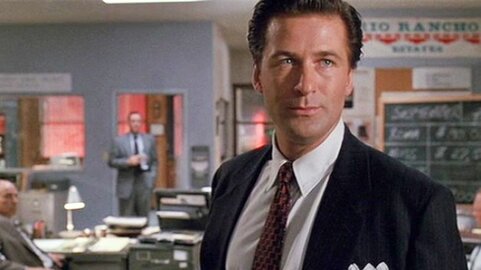|
One of the sad realities of poetry is that virtually every poem misses more readers than it hits. Even famous poems, like "The Raven" or "Nothing Gold Can Stay," impress only a fraction of the readers who encounter them. When it comes to poems posted online, or poems published in journals, the odds of engaging the average reader are steep. Most readers don't finish poems, and even when they do read them all the way to the last line (without skipping), there's usually a point of disengagement before the last line falls. They may technically read all the way to the end, but their thoughts are on who did or didn't text back, or how the cat's doing, as they're reading. Way back in the candle-lit nineteenth century, Mr. Poe insisted that the longest any poem could be and still hold a reader's attention was 100 lines. That was a century before the Internet and social media. These days, many readers jump right from the title to the last line. This seems cruel to poets, and in some ways, it is a cruel reality, but it simply reflects the fact that, for most people, thirty-seconds of attention is a lot. Even from someone who's blood-related to you, or personally mentioned in your poem. A part of every reader is waiting for your poem to fail. It's a form of confirmation bias, which means the default assumption is: if you were any good, you'd already be famous. Since you're not, you must be bad. Then if anything is off in the poem, it confirms this initial idea. And by "anything" I mean grammar errors, typos, cliches, weak images, dull language, or glitchy rhythm and meter. The instant a reader (or editor) spots something "off" in your poem, they're going to scroll away, swipe away, or flip the page. They won't feel cheated, because poems are almost always free, but they'll stand confident in the idea that your work is average or below average and all they'll likely remember is the part that failed. AI can't (yet) help you with this issue. People don't read AI's poems, either. So what can you do? Two things. The first is to accept the reality of confirmation bias. The second is to eliminate all obvious errors in your poems. This means putting more time into each poem. It means setting new poems aside for a while and editing and polishing them after you've had a chance to get some distance. There's simply no other way. To be honest, this is very good news. There seems to be something in human nature that shrugs off the notion of "toss away" poetry, or disposable poems. I'm not saying that all poems should, be weighty or profound, but I think it's a very good thing that some part of us still expects something special each time we read a new poem. There's no shame in wanting artistry from an artist! So, the way to stop the scroll is to stop your own scroll and spend more time on each of your poems to be sure you don't provide convenient escape routes for readers. If you'd like some feedback for your poetry or a bit of help polishing your words, just click one of the buttons below. Or email @ [email protected] Categories All
0 Comments
Here's a really simple branding tip that can be used by any writer or poet and, if you do it right, it can be oh-so-powerful. Ready?
Here it is. Add a touch of mystery to your brand. Whether it's a secret ingredient, a guarded maker's method, or an exotic family history, people are naturally drawn to mysteries. Sometimes not knowing who the author is can be the best method of all, as in the case of the unjustly famous "Simon" Necronomicon. But that won't really work for us. And despite appearances, I'm not suggesting that you really need to do anything dramatic. A simple touch will do. For example, in your author bio you could write something like Banna Bestpoet once lived in a haunted apartment building and her experiences there are reflected in what she writes. Or, Ned Novelmaster was once bitten by a colorful and (currently) unidentified species of snake while hiking in Indiana. You could also dig around into your past or your family lineage to see if you can find something interesting to base your mysterious touch on. Another route is to posit an iconic goal like: Sarah Screenwriter has spent years studying the principles of perpetual motion and hopes to someday build a perpetual motion machine. The most potent mysteries have to do with (of course) sexuality, cultural heritage, money, religion, death, and crime. I'll leave it at that. Is it OK to lie? Well, yeah, but if you do, don't say a lot of lies, just slip one in. I learned that when a talkative and deceitful Sherpa rescued me from freezing to death during a failed climb on Everest. Meanwhile, if you find these branding posts useful, please consider supporting the site. Your contribution is invaluable in allowing me to offer the content. PayPal [email protected] You can get Five Big Branding Tips thru the link below. Pick up my Seven Secrets of Poetry Manual also linked below. And if you'd like some expert help with editing or polishing your poems or you just want a bit of feedback, hit the links below. I look forward to reading your work! The most important thing in business is branding. The same goes for celebrities. But what many writers don't realize is: it's also true for poems, stories, and novels. It's obvious if I mention someone like Stephen King or J.K. Rowling, but it's just as true for Lord Byron and Jericho Brown.
When it comes to iconic writers in any genre, you get a picture and a feeling just from the sound of their name. You can also spot a piece of their work in an instant. This is what it takes to really get over the top as any kind of artist. You need to create an immediate association between your name, image, and a particular niche, archetype, or signature style. For most artists this means some degree of self-restraint and submission to audience capture. Mick Jagger at 80 years old just released a new Rolling Stones song and guess what, it sounds like the Rolling Stones sounded in the 1970's because that's what people expect and desire. The Stones and Jagger could play anything at this point, and have done so. Go listen to Super Heavy. But no-one liked Super Heavy, not as much as they liked the Stones, anyway. So how do you do this? And if you're already doing it, how do you do it better? The good new is, there are answers to those questions. The bad news is, they're not a simple answers. If it was easy, we'd have even more celebrities running around than we already do! I'm going to give you the answers over the course of the next few blog posts. So stay tuned. The place to start even if you've already published or posted and have fans and followers is: always do good work. Think of your work as food you're offering to people. If it's burned or bland, why give it to them. They're not starving. The only reason to offer your work is if you feel it's delicious, or deliciously bitter! So, the first step in any brand is: consistent quality. Don't hurry to get your work out; focus on making it taste good. And serving it in the right place at the right time with the right atmosphere. I'll dig in deeper on how to find out what your brand is and how to push it to the front of your creative efforts in my next post! Meanwhile, if you find these blog posts useful, please consider supporting the site. Your contribution is invaluable in allowing me to offer the content. PayPal [email protected] Pick up my 7 Secrets of Poetry guide to help write and polish your poems on your own, for a mere $5.00 right now through the following special link: https://www.buymeacoffee.com/writerdanq/extras And if you'd like some expert help with editing or polishing your poems or you just want a bit of feedback, hit the links below. While writing a poem can be a very tough challenge, getting people to read even the best of poems is almost always tougher. Poets face a serious "no win scenario" with marketing. If you don't market your poems, nobody will ever know they exist. If you market your poems, you risk looking desperate or self-absorbed. What's more, marketing is a very stressful, rough and tumble world. It's a shark tank mentality, while writing poetry is more of a Zen, one-with-nature and inspiration feeling. The difference between writing poetry and marketing it is as big as the difference between eating a nicely cooked steak or trying to eat a live cow. So what do we do? Actually, I was hoping you'd tell me! It's a very problematic obstacle and it's probably only going to get worse with the rise of AI platforms. Not because AI's will write good poetry, but because even more wannabes will flood the market cheekily devising a masterplan to use their AI word-salad to get rich and famous. It's going to be very, very ugly. And it's already pretty bad. Here are a few things I think may help:
Poetry for the most part only self-markets for dead poets. Something about being dead makes a poet more interesting. Unfortunately, you can't bask in the glory from six feet under and the light from your halo up-top past the Gates will blind you to earthly success. So, I leave you with these famous words, slightly paraphrased: "Do you know what it takes to sell poetry....?" One thing you can do is to have really solid, polished work. If you want some help with your poems, email at [email protected] OR [email protected] Or click a button below. Tally Poems Written: 311 Submissions: 51 Rejections: 21 (13 tiered) Acceptances: 0 Poem written today: "n/a" Mixing song "Coming Home" for release! Categories All |




